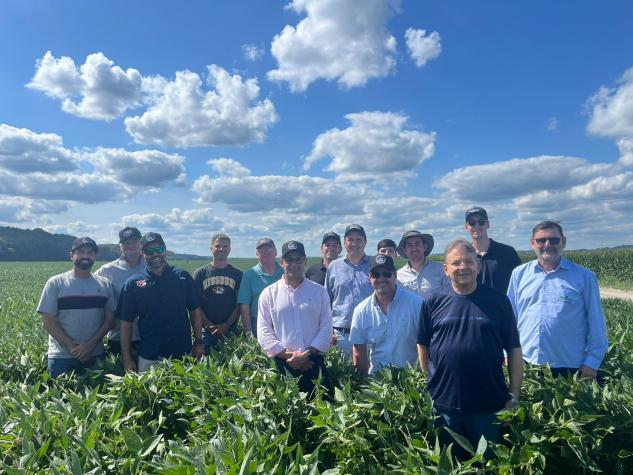COLUMBIA, Mo. – University of Missouri Extension state crops entomologist Ivair Valmorbida and state soybean specialist Andre Reis hosted a group of influential farmers and crop consultants from Brazil on July 19-20 in Columbia.
“The collaboration between Missouri and Brazilian soybean farmers is an ongoing one as each seeks to learn from the other to feed the world,” says Valmorbida.
Brazil is the world’s largest exporter of many agricultural commodities, including soybean, beef, poultry, coffee, orange juice and tobacco. It is the second-largest exporter of pork, cotton and ethanol.
It has the largest area of arable land in the world with potential trade expansion and diversification of markets and products. Most importantly, Brazil’s long growing season and ability to harvest two crops a year on the same plot of land makes it unique among soybean-producing countries.
In 2000, Brazil’s soybean exports were 40% of United States’ exports; they now surpass U.S. exports by 20%, according to USDA.
Brazil supplies more than half of the world’s soybean trade from crops produced on 17% of the country’s arable land. Challenges include increases in fuel and fertilizer costs, credit and storage limitations and an overburdened port and transport system.
“Although Brazilian soybean production competes with U.S. production in the international market, farmers in both countries face similar challenges, such as mitigating biotic and abiotic stresses and improving production efficiency in a market with narrowing financial margins,” says Reis.
Brazil’s agricultural challenges also include insects and disease, says Valmorbida. Unlike the United States, Brazilian farmers must spray their soybean with insecticides and fungicides three or four times per growing season to gain control. Unlike Missouri, they have few issues with weed control.
The farmers and consultants were from the Brazilian soybean production regions of Mato Grosso and Maranhao. The group toured MU Bradford Research Farm, campus labs and Robert Alper’s farm in Prairie Home as part of a tour of Midwestern universities. Valmorbida and Reis spoke to tour group members in their native language, Portuguese, and facilitated communication with Alper and others.
The group also learned about long-term crop rotation research at Sanborn Field on the MU campus and visited Reis’s field trials on planting dates and maturity groups as well as the facilities of the MU Soybean Variety Testing Program.
Photo
Ivair Valmorbida and Andre Reis with Brazilian farmers and crop consultants.
MU Extension state entomologist Ivair Valmorbida and state soybean specialist Andre Reis recently hosted a group of influential farmers and crop consultants from soybean production regions in Brazil. The group visited Sanborn Field, MU soybean field trials, campus labs and an area soybean farm. Photo courtesy of Ivair Valmorbida.
